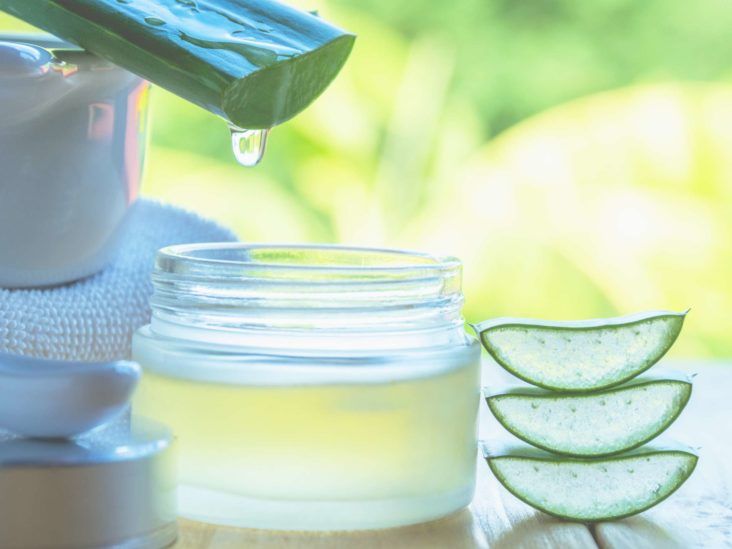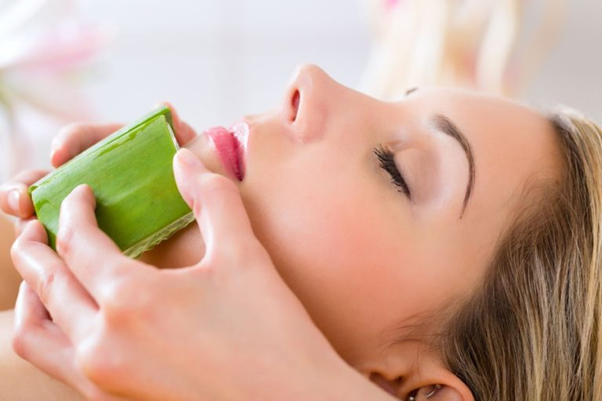Acne is the most prevalent skin disorder in the United States, affecting up to 50 million people annually. And for mild to severe acne, the majority of us often turn to homemade solutions. Aloe vera is a common natural medicine that is used to treat acne. Does aloe vera, however, treat acne? Indeed! This herb's pulp is often used to treat minor burns, rashes, and wounds. Furthermore, it has the ability to reduce acne and reduce inflammation. Are you curious about how? Continue reading to find out more about aloe vera's benefits for skincare, how to use it to treat acne, and any possible hazards.
Does Aloe Vera Help With Acne? What Is the Verdict of Science?
Indeed. Because aloe vera contains sugars and fatty acids, which have anti-inflammatory qualities, it may help prevent acne. It is a secure choice for shielding your skin and reducing inflammation because of a number of other qualities, including:
-
About 75 active components may be found in pure aloe vera gel, including lignins, enzymes, vitamins, minerals, amino acids, and salicylic acid.
-
Aloe vera aids in the quick healing of wounds and scars and encourages the creation of collagen. This characteristic helps to repair blemishes and scars from acne.
-
It protects your skin from UV-induced damage, irritation, and hypersensitivity.
-
Additionally, it promotes the development of collagen and elastin, moisturizes your skin, and delays the appearance of wrinkles.
-
Aloe vera's zinc and amino acid content tighten pores and soften skin.
-
A 2014 research looked at 60 participants' reactions to an aloe vera gel and acne medicine combo. Researchers found that topical retinoids (0.5%) and aloe vera gel (50%) worked much better together to treat acne than a placebo. Furthermore, the participants tolerated it well.
Aloe Vera: How to Use It for Acne
1. Acne Relief With Pure Aloe Vera Gel

What to Do: Use a spoon to remove the fleshy, translucent portion after cutting the aloe leaf. Concentrating on the afflicted part of your face, apply the aloe vera gel there. Turn it on and leave it there. Wash it off in the morning and continue each day until the wounds have healed.
2. Cinnamon, honey, and aloe vera
Because aloe vera has antibacterial qualities and works well against microorganisms that cause acne, it may help reduce acne. It is also beneficial for mild to severe acne since it lowers inflammation and speeds up the healing of wounds. Studies on honey and cinnamon gel have also shown comparable benefits for acne. Your chances of having clean, acne-free skin will rise if you use these three substances in your homemade and at-home masks.
What to Do: Combine two teaspoons of pure aloe vera gel with half a teaspoon of cinnamon powder or oil, four tablespoons of honey, and four tablespoons of honey. After ten minutes, wash the afflicted area with the combination that you applied. Do this every other day.
3. Lemon Juice and Aloe Vera
Lemon juice is a popular treatment for a variety of skin conditions, including acne. Its qualities are astringent, or drying. Thus, it could aid in lessening acne and drying out zits.
Use caution while using this cure if you have sensitive skin, since lemon juice may irritate and cause redness. Your skin may get dry from too much lemon juice.
What to Do: Combine two tablespoons of aloe vera gel with a ¼ teaspoon of lemon juice. Put the mixture on the region that is impacted. When it dries, wash it off. If you're heading outside, use sunscreen afterward since lemons hyperpigment your skin.
4. Tea tree and aloe vera oil
Applying 5% tea tree oil topically helps reduce inflammation and manage mild to severe acne.
How to Proceed: Use any carrier oil (jojoba, sweet almond, or olive oil) to dilute two to three drops of tea tree oil. Blend it with a tsp honey and dab on the afflicted region. Before washing it off, let it sit for fifteen minutes.
5. Aloe Vera Mist or Spray
Aloe vera may also be used to create a face spray that you can apply all day to calm your skin.
What to Do: Combine one and a half cups of purified water with a spoonful of aloe vera gel. Add two to three drops of your preferred essential oil (patch test before using). Put this mixture in a spray bottle and use it as needed to mist your face. Always give the bottle a good shake before using it.
6. Sugar, Oil Scrub, with Aloe Vera

One of the main causes of acne is an accumulation of dead skin cells on your skin. Dead skin cells may be effectively removed by scrubbing.
What to Do: Combine ¼ cup granulated sugar, ½ cup jojoba oil, and ¼ cup aloe vera gel. Apply the scrub to your face and massage it in gently, then rinse it off.
7. Apple cider vinegar and aloe vera
Because of its antibacterial qualities, apple cider vinegar may be used to treat acne.
How to Do It: Combine one teaspoon of ACV, one teaspoon of aloe vera juice, and one teaspoon of filtered water. Use the combination on your face as a toner.
8. Almond oil with aloe vera
An ideal foundation for any DIY cure is oil.
What to Do: Apply one teaspoon of aloe vera gel to your face along with three to four drops of sweet almond oil (or any other oil of your choosing). Allow it to air dry for a few minutes.
9. Rose water, cucumber, and aloe vera gel
When treating acne, rosewater tones your skin and has astringent properties. Cucumber soothes the skin, which may lessen the irritation caused by acne.
What to Do: Combine one teaspoon of aloe vera gel, cucumber juice, and rose water. Apply the mixture to the damaged part of your face, or the whole surface, using a cotton ball. When it dries, wash it off.
Read Also: Tips for Applying Makeup on Dry Skin
How Much Time Does Aloe Vera Take To Treat Acne?

Anecdotal data indicates that after two to three weeks of regular usage, using aloe vera gel or aloe vera-based skin care products twice daily may provide noticeable effects. Nevertheless, after two months of regular usage, a research employing aloe vera gel and ultrasonography technology shown a significant decrease in acne symptoms such pustules, papules, and skin roughness. For optimal outcomes, speak with your dermatologist about whether aloe vera gel should be used as a stand-alone therapy or in conjunction with medicine or ointments, depending on how severe your acne is. Please see your physician if, even after using aloe gel for two weeks, you still do not see any improvement.
Beauty YouTuber Ritu Rathee used raw aloevera gel as a mask for seven days on her forehead acne, and she reported seeing incredible changes. She states, "It [the skin] has become a lot more smoother," in a vlog. Yes, things have gotten better with time, but I won't claim that everything is crystal clear at this point.
Aloe vera has the potential to cause dangers even if it is an excellent therapy for acne. Take a look at them down below.
